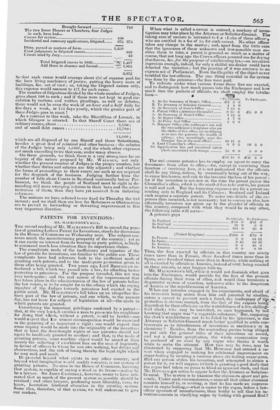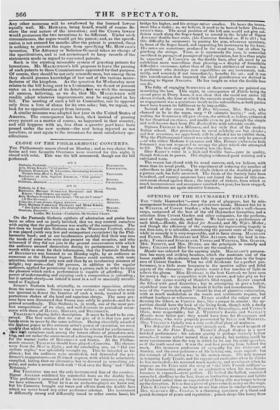PATENTS FOR INVENTIONS:
MR. MACKINNON'S BILL.
THE second reading of Mr. MACKINIsioN's Bill to amend the prac- tice of granting Letters Patent for Inventions, stands for discussion in the House of Commons on Wednesday next. The subject con- cerns much the manufacturing prosperity of the country ; yet as it can excite no interest from its bearing on party polities, is likely to command much less attention than its importance claims. The complaints made of the inefficiency and injustice of the law of patents for inventions, are familiar to the public ear. These complaints have had reference both to the inefficient mode of granting such patents, and to the inadequate protection given to them after being granted. Two years ago, Lord BROUGHAM in-
troduced a bill, which was passed into a law, for affording better protection to patentees. For the purpose intended, this act was very inadequate; and the real source of the improvement that has taken place in the administration of the law of patents before the law courts, is to be sought for in the odium which the crying
injustice of the Judges towards patentees bad excited in the public mind. Mr. MACKINNON'S bill takes up an altogether dis- tinct part of the law of patents, and one which, to the present day, has not been the subject of legislation at all—the mode in which patents arc granted.
Considering the important privileges conferred by a patent— that, at the very It ast, it entitles a man to protecute his neighbour for doing that %thick, without a patent, wculd be lawful—ono would expect that tie utmost circumspection would be exercised in the granting of so important a right ; one would expect that
some inquiry would be made into the originality of the invention:
that at least the dear-bought rights of one patentee should not again be heedlessly granted to another; and that, in the mode of granting patents, some worthier object would be aimed at than merely the inflicting (;f• exorbitant fees on the man of ingenuity, in favour of officers to whom lie can owe nothing, but delays and obstructions, and the risk of losing thereby the legal right which be may seek and merit.
Di, graceful beyond what exists in any other country, and beyond what imagination would readily conceive, is our sy stem of granting patents. No man in the House of Commons, knowing that system, is capable of saying a word in its favour—unless he be a lawyer. Sir JOHN CAMPBELL, however, seems to have inti-
mated that as much of the present system as possible should be retained ; and other lawyers, professing more liberality, have, we know, heretofore hindered alteration in the existing system. Some idea, therefore, of that sy stew, we will endeavour to give our readers.
When what is called a caveat is entered, a mockery of inves- tigation may take place by the Attorney or Solicitor-General. The taking care of caveats is intrusted to t'..e (11rks of these officeri who are entitled to a fee of 5s. for each caveat. No other officer takes any charge in the matter ; and, apart from the little care that the ignorance of these unknown and inesponsible men en- ables them to take, a patent is granted so much as a matter of course, that not long ago the Crown officers granted one for drying sloe-leaves, &c. for the purpose of adulterating tea,—an invention ingenious enough, indeed, fir only a skilful tea-dealer could have detected the imitation ; but the practice of it was contrary to an express act of Parliament. Even the illegality of the object never troubled the law-officers. The one thing essential in the system was done by the patentee—the fees were paid. To indicate under what various forms those fees are exacted, and to distinguish how much passes into the Exchequer and how much into the pockets of officials, we shall employ the tabular form—
To Officials. To Excliei,uer.
1. At the Secretary of State's Office £2 2 6
2. To Attorney or Solicitor- General-- 4 4 0
3. At Secretary of State's Office 7 13 6
4. Patent Office (Attorney-(eneral's) 9 16 0 £6 0 0 II. At Secretary of State's Office 7 13 6
6. At Signet Office 4 7 0
7. At Privy Seal Office 4 2 0
8. tramper Office (the nobleman's son and the two nobleman's daughters who are the clerks of this office, are so obliging as to save the patentee the trouble of
calling ; who, accordingly, pays the lIanaper fees at the next office) 10 II 0
9. Lord Chancellor's office 9 2 30 2 0 10. Specification fees and occasional extras (both uncertain) with stamps
23 0
0 5 0 0
£83 18 8 £41 2 0
The unfortunate patentee has to employ an agent to carry the documents from office to office,—for, except in exercising their function of receiving fees, it is not understood that the officials shall do any thing, unless, by occasionally being out of the way, to cause hindrance, and risk to the inventor the loss of his patent ; for if the invention is not new at the time the patent passes the Chancellor's office, which is the ninth it has to be sent to, his patent is null and void. But the foregoing expenses are for a patent ex- tending only to England and its Colonies; Scotland and Ireland each require a separate patent. To enter into details of the ex- penses thus incurred, is not necessary; but to convey an idea how effectually inventors are given up to the plunder of officials in this country, compared with what they would be in any other, the following table will serve—
A patentee pays
To Officials. To Exchequer.
In linglauil
£84 0 £41 0
In Scotland 78 0 6 0 In Ireland
104 0 25 0
(United Kingdom) £266 0 £72 0 In Prance
• ' 2 64 12 In Spain
0 16 60 16 In Austria
0 6 43 6
In America 0 0 6 10
Attorney or Solicitor-General much better qualified to settle con- troversies as to interferences of inventions in machinery or in chemistry ? Besides, from the contending parties being obliged to put only the general titles of their inventions on record, and not a distinct specification, the whole examination may be rendered of no avail by any rogue who thinks it worth while to make the attempt. How this may be done, may be illustrated by supposing that Mr. HOWARD had entered a ca- veat when engaged in making his celebrated improvement on sugar-boiling by creating a vacuum above the boiling sugar-pans. Had any person stolen his invention, and attempted to obtain a patent for it, we will suppose (which is granting a good deal) that the rogue had taken no pains to blind an ignorant clerk, and that Mr. HOWARD got notice to appear before the Attorney or Solicitor- General. The system is to examine the claimants apart and pri- vately. Under such circumstances,—since all that either claimant commits himself to, in writing, is that he has made an improve- ment in sugar-boiling,—what is easier to the rogue, before a law- officer ignorant of manufactures, than boldly to tell that his In- vention consists in clarifying sugar by boiling with ground flint? dependent for their efficiency on the watchfulness of a five-shilling- feed clerk; who may be outwitted, as once happened, by not knowing that sugar was "a vegetable substance." But, supposing the clerk's watchfulness not to be foiled by his ignorance, is the Thus, the fees exacted by officials in this country are ninety times more than in France, three hundred times more than in Spain, nine hundred times more than in Austria, while nothing at all is exacted by officials in America, instead of 600/. being exacted on three patents, as may happen with us. Mr. MACKINNON'S bill,.wImile it would not diminish what goes into the Exchequer, would provide for the fees of the present officials (luring their term of office, and would thus terminate a disgraceful system of exaction, unknown alike to the despotism of Austria or the republicanism of America. When any inventor engaged in his experiments, and afraid of his invention being stolen from him and patented by another, enters a caveat to prevent such a fraud, the inadequacy of tlie.,-als protection is obvious enough, from the fact of the cawats being Any other nonsense will be swallowed by the learned lawyer equally well. Mr. HOWARD, being heard, would of course de- clare the real nature of the invention; and the Crown lawyer would pronounce the two inventions to be different. Under such circumstances, the rogue would get his patent ; and, as the specifi- cation is not entered for months after the patent is granted, there is nothing to prevent the rogue from specifying Mr. HOWARD'S invention. The Attorney or Solicitor-General takes no charge of the specifications, and is not accustomed to keep records of the statements made in regard to contested patents. Such is the existing miserable system of granting patents for inventions. Mr. MAcxiscso:I's bill proposes to leave the passing of such patents to three Commissioners appointed for that purpose. Of course, they should be not only scientific men, but among them they should possess knowledge of law and of the various manu- factures of the kingdom. As the question for Wednesday next relates to the bill being sent to a Committee, we do not at present enter on a consideration of its details ; but we wish the measure all success, believing, as we do, that Mr. MACKINNOM will readily adopt whatever improvements may be suggested in his bill. The sending of such a bill to Committee, can be opposed only from a love of abuse for its own sake; but, we repeat, we look for no opposition except from lawyers. A similar measure was adopted last year in the United States of America. The consequence has been, that instead of passing every patent as a matter of course, as happened in that country, and still happens with Us, less than a quarter part have been passed under the new system—the rest being rejected as not novelties, or sent again to the inventors for more satisfactory spe- cifications.



























 Previous page
Previous page